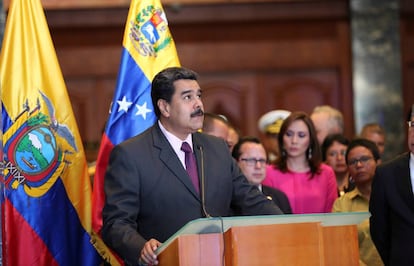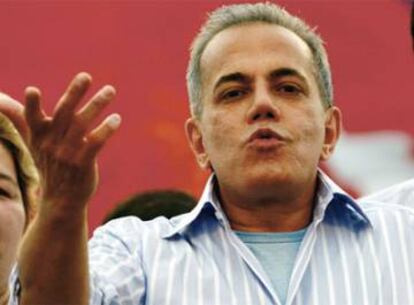Strife-torn Venezuela frees two political prisoners
President Maduro releases Manuel Rosales and Francisco Márquez days after visit by former Spanish PM

The chavista regime led by President Nicolás Maduro has freed Manuel Rosales, a former presidential candidate and ex-governor of the oil-rich Zulia state.
Before his release on Tuesday, Rosales had been held for a year at Sebin, the headquarters of Venezuela’s intelligence services, for alleged illicit enrichment during his time in office.
The announcement spread like wildfire on social media and stoked fears within the most radical sector in the opposition, which considers the release of the head of the social democratic Un Nuevo Tiempo (A New Time) part of a sinister plot that would see leaders accepting a recall referendum on Maduro’s leadership to take place in the first quarter of 2017.
My release from prison did not give me freedom but a forced exile
Francisco Márquez
The opposition, which has organized the recall referendum, wanted the vote to take place before January 10, 2017. Under Venezuela’s Constitution, this would have meant fresh elections if Maduro were to lose the plebiscite.
But the National Electoral Council (CNE), which answers to the Maduro administration, announced last month that there will be no recall referendum until February 2017, thus preventing any possibility of the country’s opposition taking power until the next elections are due, in 2019.
Back-to-back releases
Rosales’ release from prison comes the day after authorities freed Francisco Márquez, an activist who was arrested just before the movement for the recall vote reached its climax. Both releases come after former Spanish Prime Minister José Luis Rodríguez Zapatero, of the Socialist Party, made a surprise visit to Caracas last week.

These gestures may be seen as a sign that the regime wants to honor the dialogue with the opposition or at least lend credibility to the talks Zapatero has been mediating between the two sides since May. UNASUR Secretary General Ernesto Samper, who strongly favors dialogue, said on his Twitter profile: “Welcome home Manuel Rosales. This step strengthens dialogue between Venezuelans.”
A court order has put Rosales on house arrest in Caracas. Márquez, meanwhile, left the country immediately after his release from Sebin following his deal with authorities. “My release from prison did not give me freedom but forced exile,” he wrote in an open letter.
Rosales, who was elected mayor of Maracaibo, the capital of Zulia, left Venezuela in 2009 as the government mounted a criminal case against him. The attorney general’s office accused him of illicit enrichment and a judge issued an arrest warrant for him after President Hugo Chávez accused him of graft.
The announcement of the release spread like wildfire on social media
During the 2008 local elections, the late Venezuelan leader said he was “determined to arrest Rosales,” who soon came under an audit investigation. Rosales lived in exile between Lima and Panama until he decided to return on the eve of the 2015 elections that delivered a parliamentary majority to the opposition. His party invited journalists to join him on the plane that brought him back to Venezuela. Sebin was waiting for him at the airport where he was detained and imprisoned until this Wednesday.
English version by Dyane Jean François.
Tu suscripción se está usando en otro dispositivo
¿Quieres añadir otro usuario a tu suscripción?
Si continúas leyendo en este dispositivo, no se podrá leer en el otro.
FlechaTu suscripción se está usando en otro dispositivo y solo puedes acceder a EL PAÍS desde un dispositivo a la vez.
Si quieres compartir tu cuenta, cambia tu suscripción a la modalidad Premium, así podrás añadir otro usuario. Cada uno accederá con su propia cuenta de email, lo que os permitirá personalizar vuestra experiencia en EL PAÍS.
¿Tienes una suscripción de empresa? Accede aquí para contratar más cuentas.
En el caso de no saber quién está usando tu cuenta, te recomendamos cambiar tu contraseña aquí.
Si decides continuar compartiendo tu cuenta, este mensaje se mostrará en tu dispositivo y en el de la otra persona que está usando tu cuenta de forma indefinida, afectando a tu experiencia de lectura. Puedes consultar aquí los términos y condiciones de la suscripción digital.








































